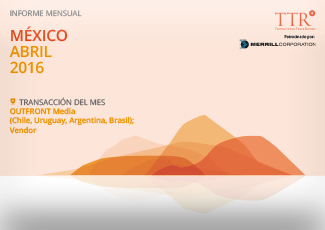A: Cravath was first approached about this transaction on behalf of Cutrale-Safra in late July, 2014, referred by Michael Rubinoff who works as a full-time advisor to the Safra Group. I’d done a number of actual and potential transactions with him for Banco Santander in the 2009-2011 time frame, during the global financial crisis, in his prior life at Bank of America Merrill Lynch. Cravath had not previously done any work for the Safra Group or Cutrale.
Q: How did Cravath land the mandate?
A: From my perspective, I did not feel that we were in a process, or beauty contest of any kind. Once we cleared out conflicts we were retained immediately. It was late in their consideration to launch a bid. The way it was presented to me by Michael, they were inclined very favorably towards bidding and at this time had decided to retain financial and other advisors. They came to us and said, “we’ve decided we would like to buy this company, help us navigate the tactical and legal challenges that stand in our way of acquiring the company.”
Q: On what basis did Cutrale-Safra launch its bid?
A: Let me address that from three dimensions: First, from the perspective of the shareholders of Chiquita, we believed the Fyffes transaction undervalued Chiquita.
Second, we believed we were better owners than shareholders of Fyffes. That speaks to a view that is more strategic in nature in terms of the relative importance in the banana distribution chain of growers versus logistics versus marketing versus retailing. At Cutrale-Safra, they believed that the growers are the most important part and that logistics is the second-most important part. Fyffes broadly viewed marketing and logistics as more important than growing. For example, if you look at the percentage of Fyffes throughput that comes from Fyffes-owned or Fyffes-managed real estate, it’s much lower than for major competitors like Dole or Del Monte.
“At Cutrale-Safra, they believed that the growers are the most important part and that logistics is the second-most important part”
Fyffes has much more of a business that is a spot purchase from growers. Cutrale-Safra have a view of the industry that it’s more important for big players in the industry to have more ownership over the plantations. By and large, all the big players in the industry – they get the production either from plantations they own, plantations they have long-term contracts with, or plantations with spot or short-term contracts, re-pricing all the time to make money. If you own, you can make money a different way by running your plantations better. Fyffes sits in the camp that willl take a higher percentage of output from spot markets. Because of that disagreement, we thought we were a better owner, one that could provide more value in the long run to all the players in the banana distribution chain.
“We believe these businesses are better located in a private company or in a much larger company that has a portfolio of other related assets”
The third issue is that we believe pure-play banana companies are just not well valued in the marketplace, because the industry is very seasonal and very cyclical, it’s hard for the capital markets to value these businesses over time. We believe these businesses are better located in a private company or in a much larger company that has a portfolio of other related assets. From a capital markets perspective we’d be a better owner; we’d be able to manage the cycle. Cutrale-Safra, they’re private, and as a private company they’re able to ride out the cyclicality and seasonality of the business. From a capital markets perspective, Chiquita-Fyffes would have been a large, close to pure-play banana company.
Q: How did the debt on Chiquita’s books affect the buyers’ appetite for the deal?
A: They viewed it as undervalued regardless and they had lots of money. They will in the near term run the business less leveraged, mainly because they will be generating less free cash flow because they will be reinvesting more in growing.
Q: How close was the Fyffes-Chiquita deal to closing when Cutrale-Safra stepped in with a competing bid?
A: We announced our offer in the second week in August. Chiquita had already mailed out their proxy material for their meeting, so their meeting was originally scheduled for three weeks after our offer was submitted. This meeting was to be held for Chiquita shareholders to approve the Fyffes transaction.
Q: What made this transaction unique?
A: First, it is somewhat rare in the US for interlopers to jump agreed bids. Jumping a bid is itself somewhat rare. It is quite rare that in the context of a jumped bid, the bidder has to take it all the way to a proxy fight.
Certainly for a transaction of this size, it is extremely rare to have an interloper go all the way to a shareholder meeting and win the vote; and even more rare that, having taken it all the way to a proxy fight, the jumped bidder actually wins the proxy fight.
“It is extremely rare to have an interloper go all the way to a shareholder meeting and win the vote; and even more rare that, having taken it all the way to a proxy fight, the jumped bidder actually wins the proxy fight.”
A second very interesting feature was that it unfolded in such a short period of time. Normally proxy contests in the US are very slow and drawn out processes of months and months. A few people deserve thanks for that, but it was largely a function of the timetable set out in the proposed Chiquita-Fyffes transaction.
Q: What are the market implications of the deal?
A: The most significant market implication of this transaction gets back to strategic vision for the industry. Chiquita, under its new owners, will be looking to invest in and grow its existing plantations. This is likely to lead to more direct competition at the growing level alongside the other two big players which are focused on growing, Dole and Del Monte, at the expense of players like Fyffes, which are more focused on logistics. If Cutrale and Safra are correct, power will shift away from logistics-focused Fyffes, towards growers.
If Chiquita is successful in buying up more plantations, and entering into longer-term contracts with growers, it will put pressure on companies like Fyffes and will lead to growers being better off. Growers will be able to command better pricing, and will grow capacity, either by buying farms, buying established growers or entering into more long-term contracts. Brazil could be an opportunity; it’s wherever they can find the land.
Q: How will this transaction impact Chiquita operations, production and distribution?
A: In terms of the basic banana distribution chain, the Cutrale-Safra vision is to invest in the growing – in the farms. You can expect to see more capital expenditure, more firepower on long-term contracts for people on the ground managing the production.
There will be modest synergistic gains on the logistics side, combining the logistics, administrative costs and expertise; the nuts and bolts of how you manage ships, rather than the ships themselves. Cutrale has its own logistics business that is primarily focused on the transportation of oranges, from a variety of places, including Brazil. The actual ships that transport oranges and bananas are different, but the management is common to both.
Chiquita’s corporate headquarters will be scaled back, and with the de-listing there will no longer be a need for public reporting which will result in cost savings. Leaving aside the headquarters synergies, we weren’t anticipating great synergies.
The ultimate unknown here for Cutrale-Safra is, are they right that investing in the farms, in the growing, has a bigger payback than investing elsewhere?
Q: What practice areas at Cravath were instrumental in its work on behalf of the buyers?
A: The three big practice areas were the M&A, finance and tax. We did some amount of work on the executive compensation and benefits, and if necessary we had a litigation side ready.
Q: What opportunities does the transaction present for the growth of Chiquita and associated businesses?
A: With the private ownership and the capital available from Cutrale-Safra, there’s an opportunity for substantial investment on the grower side that Chiquita wouldn’t have made and Chiquita-Fyffes wouldn’t have made because of their different strategic vision.
“The contest in the medium term will play out between the two competing visions for the industry”
The contest in the medium term will play out between the two competing visions for the industry. Most of the production of bananas sits with independents, people who aren’t locked into long-term contracts. At the moment there’s a lot of opportunity for Fyffes to get hold of a lot of production.
Q: Will Fyffes look to another deal to lock in a significant chunk of production?
A: Based on public statements, we do not believe that Fyffes thinks they are on the wrong side of that strategic vision. If they do not change their mind, they remain comfortable with this approach to the market, they obtain most of their production on a short-term basis and they will continue to own a significantly lower percentage of their throughput than Chiquita, Dole or Del Monte.




